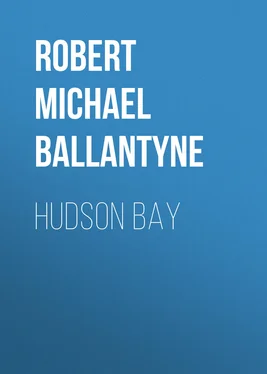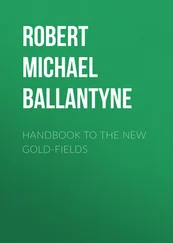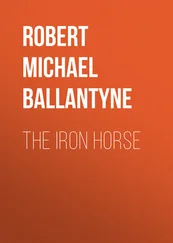Robert Michael Ballantyne - Hudson Bay
Здесь есть возможность читать онлайн «Robert Michael Ballantyne - Hudson Bay» — ознакомительный отрывок электронной книги совершенно бесплатно, а после прочтения отрывка купить полную версию. В некоторых случаях можно слушать аудио, скачать через торрент в формате fb2 и присутствует краткое содержание. Жанр: Путешествия и география, История, foreign_edu, foreign_antique, foreign_prose, на английском языке. Описание произведения, (предисловие) а так же отзывы посетителей доступны на портале библиотеки ЛибКат.
- Название:Hudson Bay
- Автор:
- Жанр:
- Год:неизвестен
- ISBN:нет данных
- Рейтинг книги:3 / 5. Голосов: 1
-
Избранное:Добавить в избранное
- Отзывы:
-
Ваша оценка:
- 60
- 1
- 2
- 3
- 4
- 5
Hudson Bay: краткое содержание, описание и аннотация
Предлагаем к чтению аннотацию, описание, краткое содержание или предисловие (зависит от того, что написал сам автор книги «Hudson Bay»). Если вы не нашли необходимую информацию о книге — напишите в комментариях, мы постараемся отыскать её.
Hudson Bay — читать онлайн ознакомительный отрывок
Ниже представлен текст книги, разбитый по страницам. Система сохранения места последней прочитанной страницы, позволяет с удобством читать онлайн бесплатно книгу «Hudson Bay», без необходимости каждый раз заново искать на чём Вы остановились. Поставьте закладку, и сможете в любой момент перейти на страницу, на которой закончили чтение.
Интервал:
Закладка:
During the first years of the Company, they were much censured for not carrying out the provision contained in the royal charter, that they should prosecute Discovery as much as possible; and it was even alleged that they endeavoured to prevent adventurers, not connected with themselves, from advancing in their researches. There is every reason to believe, however, that this censure was undeserved. A new company, recently formed in a wild country, could not at first be expected to have time or funds to advance the arduous and expensive cause of Discovery. With regard to their having impeded the attempts of others, it is doubtful whether any one in the service ever did so; but even had such been the case, the unauthorised and dishonourable conduct of one or two of their servants does not sanction the condemnation of the whole Company. Besides, the cause of Discovery was effectively advanced in former days by Herne, and in later years by Dease and Simpson, Dr Rae, and others; so that, whatever might have been the case at first, there can be no doubt that the Company have done much for the cause of late years.
The trade carried on by the Company is in peltries of all sorts, oil, dried and salted fish, feathers, quills, etcetera. A list of some of their principal articles of commerce is subjoined:—
Beaver-skins.
Bear-skins, Black.
Bear-skins, Brown.
Bear-skins, White or Polar.
Bear-skins, Grizzly.
Badger-skins.
Buffalo or Bison Robes 1 1 The hide of the bison—or, as it is called by the fur-traders, the buffalo—when dressed on one side and the hair left on the other, is called a robe. Great numbers are sent to Canada, where they are used for sleigh wrappers in winter. In the Indian county they are often used instead of blankets.
.
Castorum, a substance procured from the body of the beaver.
Deer-skins, Rein.
Deer-skins, Red.
Deer-skins, Moose or Elk.
Deer-skins, parchment.
Feathers of all kinds.
Fisher-skins.
Fox-skins, Black.
Fox-skins, Silver.
Fox-skins, Cross.
Fox-skins, Red.
Fox-skins, White.
Fox-skins, Blue.
Goose-skins.
Ivory (tusks of the Walrus).
Lynx-skins.
Marten-skins.
Musquash-skins.
Otter-skins.
Oil, Seal.
Oil, Whale.
Swan-skins.
Salmon, salted.
Seal-skins.
Wolf-skins
Wolverine-skins.
The most valuable of the furs mentioned in the above list is that of the black fox . This beautiful animal resembles in shape the common fox of England, but it is much larger, and jet-black, with the exception of one or two white hairs along the back-bone and a pure white tuft on the end of the tail. A single skin sometimes brings from twenty-five to thirty guineas in the British market; but, unfortunately, they are very scarce. The silver fox differs from the black fox only in the number of white hairs with which its fur is sprinkled; and the more numerous the white hairs, the less valuable does it become. The cross fox is a cross between the black or silver and the red fox. The red fox bears a much inferior fur to the other kinds; yet it is a good article of trade, as this species is very numerous. These four kinds of foxes are sometimes produced in the same litter, the mother being a red fox. The white fox is of less value than the red, and is also very numerous, particularly on the shores of Hudson Bay. The variety termed the blue fox is neither numerous nor valuable. It is of a dirty bluish-grey colour, and seldom makes its appearance at the Company’s posts.
Beaver, in days of yore, was the staple fur of the country; but, alas! the silk hat has given it its death-blow, and the star of the beaver has now probably set for ever—that is to say, with regard to men; probably the animals themselves fancy that their lucky star has just risen. The most profitable fur in the country is that of the marten. It somewhat resembles the Russian sable, and generally maintains a steady price. These animals, moreover, are very numerous throughout most part of the Company’s territories, particularly in Mackenzie River, whence great numbers are annually sent to England.
All the above animals and a few others are caught in steel and wooden traps by the natives; while deer, buffaloes, etcetera, are run down, shot, and snared in various ways, the details of which will be found in another part of this volume.
Trade is carried on with the natives by means of a standard valuation, called in some parts of the country a castor . This is to obviate the necessity of circulating money, of which there is little or none, excepting in the colony of Red River. Thus, an Indian arrives at a fort with a bundle of furs, with which he proceeds to the Indian trading-room. There the trader separates the furs into different lots, and, valuing each at the standard valuation, adds the amount together, and tells the Indian (who has looked on the while with great interest and anxiety) that he has got fifty or sixty casters; at the same time he hands the Indian fifty or sixty little bits of wood in lieu of cash, so that the latter may know, by returning these in payment of the goods for which he really exchanges his skins, how fast his funds decrease. The Indian then looks round upon the bales of cloth, powder-horns, guns, blankets, knives, etcetera, with which the shop is filled, and after a good while makes up his mind to have a small blanket. This being given him, the trader tells him that the price is six castors; the purchaser hands back six of his little bits of wood, and selects something else. In this way he goes on till all his wooden cash is expended; and then, packing up his goods, departs to show his treasures to his wife, and another Indian takes his place. The value of a castor is from one to two shillings. The natives generally visit the establishments of the Company twice a year—once in October, when they bring in the produce of their autumn hunts; and again in March, when they come in with that of the great winter hunt.
The number of castors that an Indian makes in a winter hunt varies from fifty to two hundred, according to his perseverance and activity, and the part of the country in which he hunts. The largest amount I ever heard of was made by a man called Piaquata-Kiscum, who brought in furs on one occasion to the value of two hundred and sixty castors. The poor fellow was soon afterwards poisoned by his relatives, who were jealous of his superior abilities as a hunter, and envious of the favour shown him by the white men.
After the furs are collected in spring at all the different outposts, they are packed in conveniently-sized bales, and forwarded, by means of boats and canoes, to the three chief depôts on the sea-coast—namely, Fort Vancouver, at the mouth of the Columbia River, on the shores of the Pacific; York Fort, on the shores of Hudson Bay; and Moose Factory, on the shores of James Bay—whence they are transported in the Company’s ships to England. The whole country in summer is, consequently, in commotion with the passing and repassing of brigades of boats laden with bales of merchandise and furs; the still waters of the lakes and rivers are rippled by the paddle and the oar; and the long-silent echoes which have slumbered in the icy embrace of a dreary winter, are now once more awakened by the merry voice and tuneful song of the hardy voyageur .
This slight sketch of the Hudson Bay Company and of the territories occupied by them may, for the present, serve to give some idea of the nature of the service and the appearance of the country. We shall now proceed to write of the Indiana inhabiting these wild regions.
(Doubtless the reader is aware that the chartered rights of the Hudson Bay Company now (1875) no longer exist; nevertheless their operations are still conducted in the same manner as of old, so that the above description is applicable in almost all respects to the greater part of the country at the present time.)
Читать дальшеИнтервал:
Закладка:
Похожие книги на «Hudson Bay»
Представляем Вашему вниманию похожие книги на «Hudson Bay» списком для выбора. Мы отобрали схожую по названию и смыслу литературу в надежде предоставить читателям больше вариантов отыскать новые, интересные, ещё непрочитанные произведения.
Обсуждение, отзывы о книге «Hudson Bay» и просто собственные мнения читателей. Оставьте ваши комментарии, напишите, что Вы думаете о произведении, его смысле или главных героях. Укажите что конкретно понравилось, а что нет, и почему Вы так считаете.












